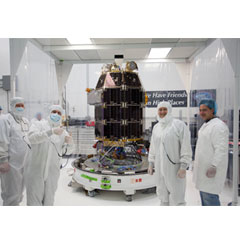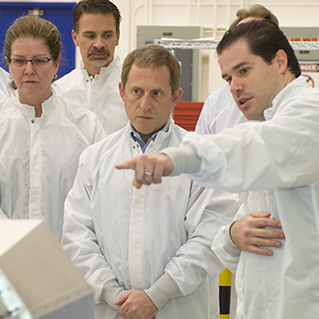People
Stephen Edberg
Astronomer (Retired)

Where are you from?
I grew up in West Covina and Covina, Calif. I now live in the foothills west of there in a town called La Cañada.
See the beauty of the world with your own eyes and learn to see the corresponding beauty that mathematical calculations tell you is present.
Describe the first time you made a personal connection with outer space.
One of my earliest memories is going out with my dad into our West Covina backyard to try and see one of the two bright comets visible in 1957 (this was when I was about four and half-years old). We weren't successful, but on and off over the next few years we looked for, and successfully watched, the Echo satellite cross the sky.
I do remember being up before dawn to watch Ranger 9's television pictures as it crashed (by design) into the moon, as well as the manned Mercury mission flights. By high school, I was hooked.
How did you end up working in the space program?
After graduate school I was working at the San Fernando Observatory doing solar research. When it was time to move on I was fortunate to find a job at NASA's Jet Propulsion Laboratory (JPL) where I have been ever since. I have worked on a variety of projects -- spanning robotic spaceflight planning and flight operations to outreach.
Who inspired you?
My parents were open to following my lead or providing introductions to a wide variety of the sciences and they gave me the support to pursue those interests from a toddler on to a graduate student. My high school general science and chemistry teacher and astronomy club adviser, Steve Iverson, guided me with lots of support and freedom to learn across a variety of subjects.
What is an Astronomer?
An astronomer is someone who studies the Universe, from the sun and the planets in the solar system to the remnant radiation of the Big Bang's expansion, which has become the Universe we see now. Astronomy is a field in which it helps to know everything: mathematics, physics, chemistry, electronics, engineering, computer programming, and writing. Of course, knowing everything is unrealistic, but the more you know, the more connections you can make to ask and answer questions about the Universe and the way it works.
For me, being an astronomer has allowed me to do research, participate in the planning and operation of robotic spacecraft, share my passion and enthusiasm for exploration and science with students, teachers and the public, and it has provided opportunities for me to visit six continents.
Tell us about a favorite moment in your career.
It's hard for me to pick one. Among my favorites is sitting in JPL's cafeteria while watching Voyager pictures of Saturn come in every few minutes. It was like picnicking on Voyager!
I enjoyed preparing all levels of outreach materials and working with people interested in Halley's Comet and, of course, observing it and other comets myself.
It was great to be a part of the Galileo project. A group of us were among the first to see the surface of an asteroid. I was also with a different group as the first pictures of Saturn's odd little moon named Phoebe came in. Being there to see Phoebe was very, very special to a space geek like me.
What advice would you give to someone who wants to take the same career path as you?
Learn as much as you can about everything that is interesting to you, and learn to communicate well. Be curious and actively explore and observe the world around you. Keep a sense of wonder. See the beauty of the world with your own eyes and learn to see the corresponding beauty that mathematical calculations tell you is present.
Give yourself time to think and make connections widely across your personal knowledge base. When an idea strikes, promptly follow it wherever it takes you. Be passionate about your interests, and share your passion with others.
Don't be shy -- talk to scientists who work in a field you are interested in and especially do not hesitate to visit your teachers and professors to ask questions. Let a favorite educator become a mentor for you.
What do you do for fun?
I love bicycle riding -- I'm a three-bicycle family! Commuting to work and riding for fun on weekends is good for me physically and mentally, and I get to see a lot of territory too. I observe the sky, both day and night, for atmospheric effects like rainbows, haloes and glories. I still have and use telescopes (one dating back to high school) with my free time -- sometimes for fun, sometimes for science. When I can, I go on solar eclipse expeditions. I'm a photographer as well (usually landscapes). I enjoy building gadgets (usually for my telescopes) on the bench in my garage.




